中国哲学史的考试重点
《中国哲学史》考试大纲
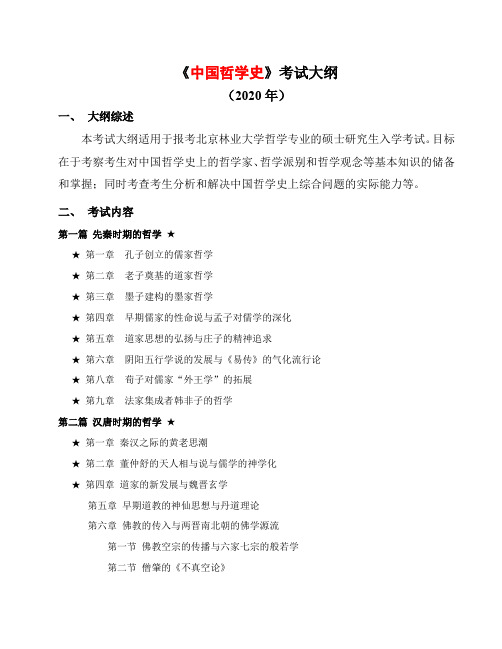
《中国哲学史》考试大纲(2020年)一、大纲综述本考试大纲适用于报考北京林业大学哲学专业的硕士研究生入学考试。
目标在于考察考生对中国哲学史上的哲学家、哲学派别和哲学观念等基本知识的储备和掌握;同时考查考生分析和解决中国哲学史上综合问题的实际能力等。
二、考试内容第一篇先秦时期的哲学★★第一章孔子创立的儒家哲学★第二章老子奠基的道家哲学★第三章墨子建构的墨家哲学★第四章早期儒家的性命说与孟子对儒学的深化★第五章道家思想的弘扬与庄子的精神追求★第六章阴阳五行学说的发展与《易传》的气化流行论★第八章荀子对儒家“外王学”的拓展★第九章法家集成者韩非子的哲学第二篇汉唐时期的哲学★★第一章秦汉之际的黄老思潮★第二章董仲舒的天人相与说与儒学的神学化★第四章道家的新发展与魏晋玄学第五章早期道教的神仙思想与丹道理论第六章佛教的传入与两晋南北朝的佛学源流第一节佛教空宗的传播与六家七宗的般若学第二节僧肇的《不真空论》第七章佛教的鼎盛与隋唐佛教哲学★第四节禅宗的顿悟成佛论★第五节佛教与中国本土文化的融合第八章道教的国教化与隋唐道教哲学第一节由隋入唐道教的的繁荣与重玄学第三节道教信仰提供的思想史意义第九章经学的重整与唐代儒家哲学★第一节儒学对佛学的回应与唐初经学的重整★第二节韩愈的道统论第三节李翱的《复性书》第五节刘禹锡的“天与人交相胜”论第三篇北宋至明中叶时期的哲学★第一章道学初创第一节北宋三先生第二节周敦颐的《太极图说》与《易通》第三节邵雍的先天“象数”学★第二章张载的本体论与境界论★第三章程颢、程颐的“义理之学”★第四章朱熹的理学★第五章陆九渊的心学★第八章王守仁的心学体系第四篇明中叶至鸦片战争时期的哲学第三章王夫之对宋明理学的总结第五章戴震的哲学倾向第五篇近代中国(鸦片战争至中华人民共和国成立)的哲学发展三、考试要求要求考生全面掌握中国哲学史每一历史时期各哲学学派和哲学思潮及其代表人物思想,了解中国哲学发展的基本脉络,熟悉中华人文精神和中国哲学的特点,在掌握基本概念、知识点基础上重点把握中国哲学整体性、规律性问题。
哲学考研中国哲学史重要知识点串讲
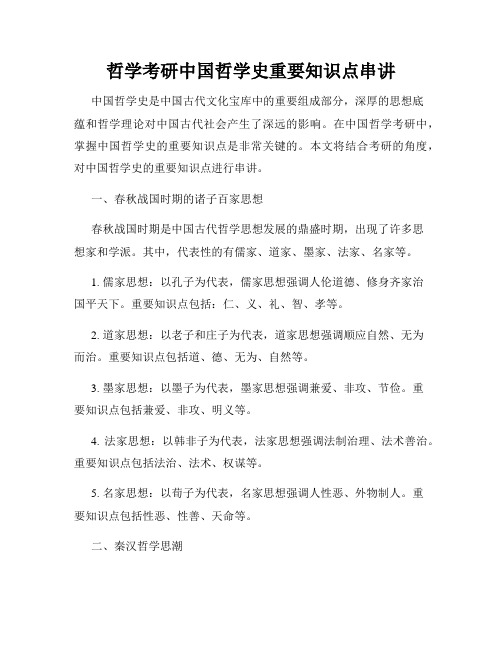
哲学考研中国哲学史重要知识点串讲中国哲学史是中国古代文化宝库中的重要组成部分,深厚的思想底蕴和哲学理论对中国古代社会产生了深远的影响。
在中国哲学考研中,掌握中国哲学史的重要知识点是非常关键的。
本文将结合考研的角度,对中国哲学史的重要知识点进行串讲。
一、春秋战国时期的诸子百家思想春秋战国时期是中国古代哲学思想发展的鼎盛时期,出现了许多思想家和学派。
其中,代表性的有儒家、道家、墨家、法家、名家等。
1. 儒家思想:以孔子为代表,儒家思想强调人伦道德、修身齐家治国平天下。
重要知识点包括:仁、义、礼、智、孝等。
2. 道家思想:以老子和庄子为代表,道家思想强调顺应自然、无为而治。
重要知识点包括道、德、无为、自然等。
3. 墨家思想:以墨子为代表,墨家思想强调兼爱、非攻、节俭。
重要知识点包括兼爱、非攻、明义等。
4. 法家思想:以韩非子为代表,法家思想强调法制治理、法术善治。
重要知识点包括法治、法术、权谋等。
5. 名家思想:以荀子为代表,名家思想强调人性恶、外物制人。
重要知识点包括性恶、性善、天命等。
二、秦汉哲学思潮秦汉时期是中国哲学史上的一个重要时期,主要表现为法家思潮和儒家思潮的发展。
1. 法家思潮:以李斯为代表,法家思潮在秦朝得到了广泛的应用。
重要知识点包括法治思想、法家理论体系等。
2. 儒家思潮:秦朝灭亡后,儒家思想再度复兴。
重要知识点包括孔子学派的衍化、儒家经典的整理等。
三、南北朝时期的佛教和道教南北朝时期,佛教和道教的兴起对中国哲学产生了重要的影响。
1. 佛教:佛教起源于印度,随着东渐传入中国,并得到了广泛传播。
重要知识点包括佛陀生平、佛教教义等。
2. 道教:道教起源于中国,它强调追求长生不老的方法和境界。
重要知识点包括道教经典、道教修炼方法等。
四、隋唐宋元明清时期的哲学新篇章隋唐时期是中国古代哲学发展的又一个鼎盛时期,涌现了许多重要的哲学思想。
1. 唐代哲学:唐代出现了玄宗时期的玄宗皇帝和颍川柳祗两位皇帝。
中国哲学史期末考试试题
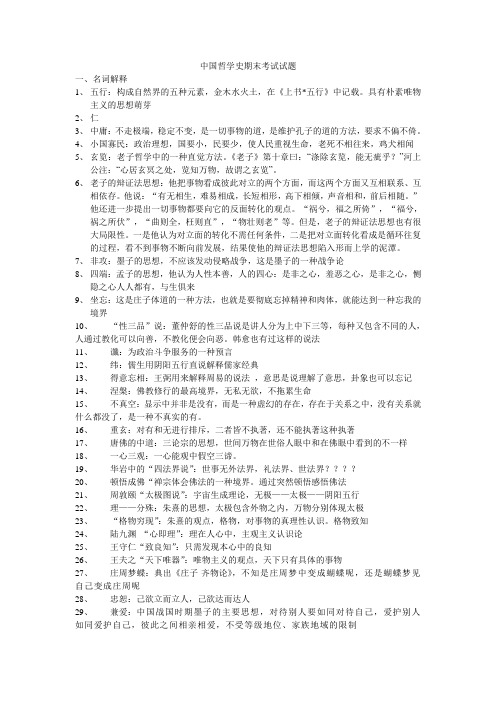
中国哲学史期末考试试题一、名词解释1、五行:构成自然界的五种元素,金木水火土,在《上书*五行》中记载。
具有朴素唯物主义的思想萌芽2、仁3、中庸:不走极端,稳定不变,是一切事物的道,是维护孔子的道的方法,要求不偏不倚。
4、小国寡民:政治理想,国要小,民要少,使人民重视生命,老死不相往来,鸡犬相闻5、玄览:老子哲学中的一种直觉方法。
《老子》第十章曰:“涤除玄览,能无疵乎?”河上公注:“心居玄冥之处,览知万物,故谓之玄览”。
6、老子的辩证法思想:他把事物看成彼此对立的两个方面,而这两个方面又互相联系、互相依存。
他说:“有无相生,难易相成,长短相形,高下相倾,声音相和,前后相随。
”他还进一步提出一切事物都要向它的反面转化的观点。
“祸兮,福之所倚”,“福兮,祸之所伏”,“曲则全,枉则直”,“物壮则老”等。
但是,老子的辩证法思想也有很大局限性。
一是他认为对立面的转化不需任何条件,二是把对立面转化看成是循环往复的过程,看不到事物不断向前发展,结果使他的辩证法思想陷入形而上学的泥潭。
7、非攻:墨子的思想,不应该发动侵略战争,这是墨子的一种战争论8、四端:孟子的思想,他认为人性本善,人的四心:是非之心,羞恶之心,是非之心,恻隐之心人人都有,与生俱来9、坐忘:这是庄子体道的一种方法,也就是要彻底忘掉精神和肉体,就能达到一种忘我的境界10、“性三品”说:董仲舒的性三品说是讲人分为上中下三等,每种又包含不同的人,人通过教化可以向善,不教化便会向恶。
韩愈也有过这样的说法11、谶:为政治斗争服务的一种预言12、纬:儒生用阴阳五行直说解释儒家经典13、得意忘相:王弼用来解释周易的说法,意思是说理解了意思,卦象也可以忘记14、涅槃:佛教修行的最高境界,无私无欲,不拖累生命15、不真空:显示中并非是没有,而是一种虚幻的存在,存在于关系之中,没有关系就什么都没了,是一种不真实的有。
16、重玄:对有和无进行排斥,二者皆不执著,还不能执著这种执著17、唐佛的中道:三论宗的思想,世间万物在世俗人眼中和在佛眼中看到的不一样18、一心三观:一心能观中假空三谛。
中 国哲学史考试试题
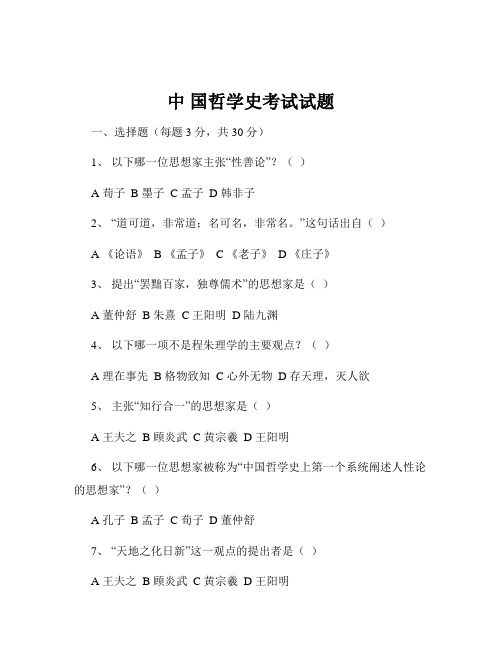
中国哲学史考试试题一、选择题(每题 3 分,共 30 分)1、以下哪一位思想家主张“性善论”?()A 荀子B 墨子C 孟子D 韩非子2、“道可道,非常道;名可名,非常名。
”这句话出自()A 《论语》B 《孟子》C 《老子》D 《庄子》3、提出“罢黜百家,独尊儒术”的思想家是()A 董仲舒B 朱熹C 王阳明D 陆九渊4、以下哪一项不是程朱理学的主要观点?()A 理在事先B 格物致知C 心外无物D 存天理,灭人欲5、主张“知行合一”的思想家是()A 王夫之B 顾炎武C 黄宗羲D 王阳明6、以下哪一位思想家被称为“中国哲学史上第一个系统阐述人性论的思想家”?()A 孔子B 孟子C 荀子D 董仲舒7、“天地之化日新”这一观点的提出者是()A 王夫之B 顾炎武C 黄宗羲D 王阳明8、佛教传入中国的时间大致在()A 西汉末年B 东汉末年C 魏晋南北朝D 隋唐时期9、以下哪一部著作是中国哲学史上第一部系统论述宇宙生成论的著作?()A 《周易》B 《老子》C 《庄子》D 《淮南子》10、提出“民贵君轻”思想的是()A 孔子B 孟子C 荀子D 韩非子二、填空题(每题 2 分,共 20 分)1、中国哲学的萌芽时期是______时期。
2、孔子的核心思想是“______”和“______”。
3、《庄子》一书分内篇、外篇和______篇。
4、法家的代表人物有______、______、______等。
5、玄学的主要论题有“______”“______”“______”等。
6、宋明理学分为______和______两大派别。
7、明清之际的三大思想家是______、______、______。
8、中国古代哲学中的“气”概念,最早见于______。
9、佛教的基本教义是“______”“______”“______”。
10、道教的经典著作是______。
三、简答题(每题 10 分,共 30 分)1、简述孔子的教育思想。
孔子是中国古代伟大的思想家和教育家,他的教育思想对后世产生了深远的影响。
《中国哲学史》考试大纲
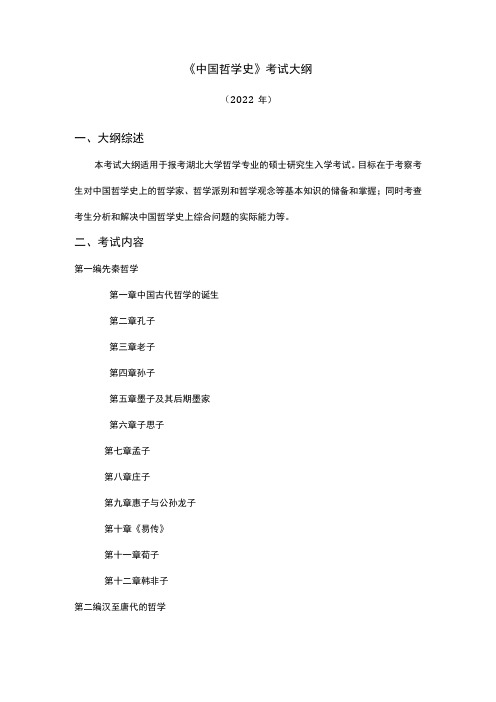
《中国哲学史》考试大纲(2022年)一、大纲综述本考试大纲适用于报考湖北大学哲学专业的硕士研究生入学考试。
目标在于考察考生对中国哲学史上的哲学家、哲学派别和哲学观念等基本知识的储备和掌握;同时考查考生分析和解决中国哲学史上综合问题的实际能力等。
二、考试内容第一编先秦哲学第一章中国古代哲学的诞生第二章孔子第三章老子第四章孙子第五章墨子及其后期墨家第六章子思子第七章孟子第八章庄子第九章惠子与公孙龙子第十章《易传》第十一章荀子第十二章韩非子第二编汉至唐代的哲学第一章汉初的哲学思想第二章董仲舒第三章谶纬的盛行及其批判者杨雄、桓谭第四章王充第五章魏晋玄学第六章佛教的传入与早期中国佛教哲学第七章汉魏南北朝时期的道教第八章隋唐时期的道教哲学第九章隋唐时期的佛教哲学第十章隋唐经学与儒家哲学第三编宋至清代的哲学第一章宋明理学的问题与发展第二章张载第三章程颖、程颐(二程))第四章朱熹第五章陈亮、叶适第六章陆九渊第七章陈献章、湛若水第八章王守仁第九章黄宗羲第十章方以智第十一章王夫之第十二章颜元、戴震第四篇现代哲学第一章康有为、谭嗣同与严复第二章章太炎第三章孙中山第四章陈独秀与李大钊第五章胡适、梁漱溟与张君勋第六章熊十力第七章冯友兰第八章金岳霖与贺麟第九章李达与艾思奇第十章毛泽东第十一章牟宗三与唐君毅三、考试要求要求考生全面掌握中国哲学史每一历史时期各哲学学派和哲学思潮及其代表人物思想,了解中国哲学发展的基本脉络,熟悉中国哲学的特点,在掌握基本概念、知识点基础上重点把握中国哲学整体性、规律性问题。
三、试题结构1、名词解释(约占30分)2、简答题(约占60分)3、论述题(约占60分)五、考试方式及时间考试方式为闭卷、笔试,时间为3小时,满分为150分。
六、主要参考书郭齐勇编著:《中国哲学史》,高等教育出版社,2006年。
山东省考研哲学中国哲学史考点解析

山东省考研哲学中国哲学史考点解析中国哲学史是中国哲学研究的重要领域之一,历经数千年的发展,涵盖了众多思想家和学派的观点和贡献。
作为山东省考研哲学专业的考点之一,本文将对山东省考研哲学中国哲学史的考点进行解析,帮助考生更好地应对考试。
一、先秦思想及其演变先秦思想是中国哲学史的开端,也是山东省考研哲学考点的重点之一。
先秦诸子百家中,儒家、道家、墨家、法家等思想体系逐渐形成,并相互影响、交流。
考生需要理解各家的核心观点,如儒家的仁义礼智信、道家的无为而治、墨家的兼爱非攻、法家的法治有术等。
同时,还需注意各个思想流派的相互对立和融合,及其对后世思想和文化的影响。
二、两汉哲学及其特点两汉时期是中国哲学史发展的重要时期,儒家成为统治思想,同时佛教的传入也对中国哲学产生了深远影响。
在此阶段,思想家们对先秦思想进行了继承和扩展,提出了许多自己的观点和理论。
考生应重点关注汉代儒家学者如孔、孟、荀、墨等人的思想,以及佛教思想的传播与融合,比如戒律、空性等概念。
三、宋明理学及其主要内容宋明理学是中国哲学史的重要流派,是中国古代哲学史上的巅峰之作。
考生需要了解理学的基本思想,如理气论、六经注疏、四书五经等,以及其主要代表人物如朱熹、程颐、程颢等的观点和贡献。
此外,应关注其对后世哲学、政治和社会的影响,如理学改革等。
四、近现代思潮及其对中国哲学的影响近现代思潮是中国哲学史的重要组成部分,包括启蒙思想、科学技术思潮、民族复兴思潮等。
考生需要了解这些思潮对中国传统哲学的冲击和改变,如康有为、梁启超的变法思想,以及鲁迅的思想等。
此外,还需注意西方哲学的传入与融合,如马克思主义的引入和批判。
五、中国哲学史的当代研究及其现状中国哲学史的当代研究是山东省考研哲学中国哲学史考点的重要内容之一。
考生需了解当前中国哲学史研究的现状和发展趋势,如传统研究与新视角,西方研究与本土学派的对话等。
同时,还可以关注一些具有代表性的当代中国哲学家及其学术观点,如王阳明的心学、李泽厚的价值观念体系等。
(完整word版)中国哲学史重点
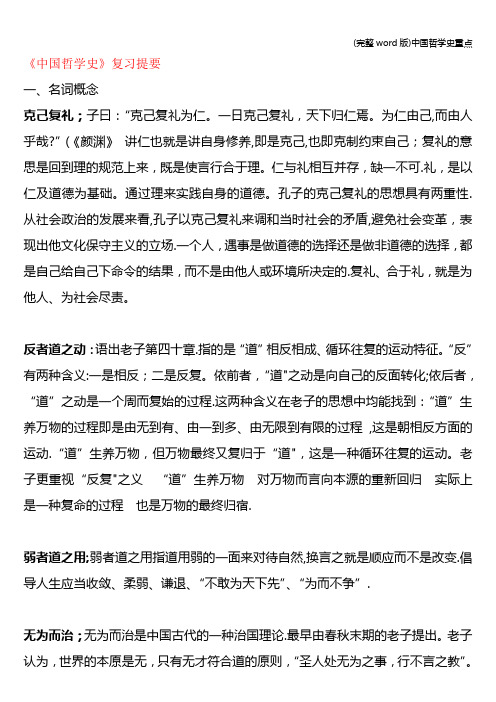
《中国哲学史》复习提要一、名词概念克己复礼;子曰:“克己复礼为仁。
一日克己复礼,天下归仁焉。
为仁由己,而由人乎哉?”(《颜渊》讲仁也就是讲自身修养,即是克己,也即克制约束自己;复礼的意思是回到理的规范上来,既是使言行合于理。
仁与礼相互并存,缺一不可.礼,是以仁及道德为基础。
通过理来实践自身的道德。
孔子的克己复礼的思想具有两重性.从社会政治的发展来看,孔子以克己复礼来调和当时社会的矛盾,避免社会变革,表现出他文化保守主义的立场.一个人,遇事是做道德的选择还是做非道德的选择,都是自己给自己下命令的结果,而不是由他人或环境所决定的.复礼、合于礼,就是为他人、为社会尽责。
反者道之动:语出老子第四十章.指的是“道”相反相成、循环往复的运动特征。
“反”有两种含义:一是相反;二是反复。
依前者,“道"之动是向自己的反面转化;依后者,“道”之动是一个周而复始的过程.这两种含义在老子的思想中均能找到:“道”生养万物的过程即是由无到有、由一到多、由无限到有限的过程,这是朝相反方面的运动.“道”生养万物,但万物最终又复归于“道",这是一种循环往复的运动。
老子更重视“反复"之义“道”生养万物对万物而言向本源的重新回归实际上是一种复命的过程也是万物的最终归宿.弱者道之用;弱者道之用指道用弱的一面来对待自然,换言之就是顺应而不是改变.倡导人生应当收敛、柔弱、谦退、“不敢为天下先”、“为而不争”.无为而治;无为而治是中国古代的一种治国理论.最早由春秋末期的老子提出。
老子认为,世界的本原是无,只有无才符合道的原则,“圣人处无为之事,行不言之教”。
无为而治是道家基本的政治主张。
“无为而治”的主要内容是“为无为”和“无为而无不为",具体措施是“劝统治者少干涉”和“使民众无知无欲”.老子认为天地万物都是由道化生的,而且天地万物的运动变化也遵循道的规律。
老子说:“人法地,地法天,天法道,道法自然".道的最根本规律就是自然,即自然而然、本然。
哲学:中国哲学史考试试题

哲学:中国哲学史考试试题1、名词解释合同异正确答案:惠施学派的基本观点,强调事物之间的统一性,与离坚白相对。
《庄子•秋水》:“合同异,离坚白。
”《庄子•天下》所列惠施历物十事的第五事:“大同而与小同异,此之谓(江南博哥)小同异;万物毕同毕异,此之谓大同异。
”揭示事物同异关系的相对性,从而否认同和异概念的确定性,把同和异合二为一,引伸出“泛爱万物,天地一体”的结论。
合同异的著名论题有“天与地卑,山与泽平”、“日方中方睨,物方生方死”、“南方无穷而有穷”、“今日适越而昔来”等。
2、名词解释本性即佛正确答案:慧能认为人人都有成佛的本性,或称本心。
愚人智人佛性本无差别,只是因为迷悟不同,所以有愚有智。
慧能强调的是,佛性是人的唯一本性,人性就是佛性,佛不是别的,就是自己的本性,所以他说“佛向性中坐,莫向身外求”。
佛和众生的区别就在于觉与不觉,佛并不在遥远的彼岸世界,而在个人的心中。
3、名词解释合二而一正确答案:语出方以智《东西均•三征》:“交也者,合二而一也;轮也者,首尾相衔也。
凡有动静往来,无不交轮,则真常贯合,于幾可征也。
”用其概括事物矛盾运动的规律,以强调“有一必有二,二本于一”,“两间无不交,无不二而一。
”4、问答题简述墨子的认识论正确答案:墨子认识论是朴素唯物主义认识论,基本倾向是经验论,但对于理性的作用也有一定的认识。
1墨子肯定了人们的认识只能来源于人们的感官所能感觉到的客观实际;2在中国哲学史上,墨子首先把“名”“实”问题提到了认识范围,并做了唯物主义论证。
墨子认为,“实”是第一性的,“名”是反应实的,是第二性的,只知其名不知其实,并不是真正的知;3墨子从唯物主义认识论的立场出发,进一步提出了判断是非真伪的标准问题。
判断利害必须有一定的标准。
墨子认为这个标准有三个:第一个标准即“上本之于古者圣王之事”。
第二个标准即“下元察百姓耳目之实”。
第三个即“发以为刑政,观其中国家百姓人民之利”;4与认识论相联系,墨子在逻辑思想上首先提出了“类”、“故”的概念,作为明辨是非,审察异同的方法。
哲学:中国哲学史考试试题四

哲学:中国哲学史考试试题四1、名词解释一念三千正确答案:一念即一念心,三千指三千世界,总括一切法之谓。
智说:“此三千在一念心,若无心而已,介尔有心,即具三千。
”这是说,三千世界即一切现象皆存在于一念心中,这是因(江南博哥)为三千同一性故,皆为同一真如本心之显现,所以说一念三千。
2、名词解释精气正确答案:指一种精灵细微的物质。
《易•系辞上》:“精气为物,游魂为变,是故知鬼神之情状。
”《管子•内业》:“思之而不通,鬼神将通之;非鬼神之力也,精气之极也。
”还认为精气“下生五谷,上为列星;流于天地之间,谓之鬼神;藏于胸中,谓之圣人。
”后来思想家一般把精气看作是一种构成人的生命和精神的东西。
王充《论衡•论死》:“人之所以生者,精气也。
”戴震《原善•绪言下》:“知觉者,其精气之秀也。
”3、名词解释四端正确答案:孟子的用语,他认为人生下来就有“恻隐之心”,“羞恶之心”,“辞让之心”,“是非之心”,是仁、义、理、智四种道德观念的萌芽,是人的最基本的道德品质。
是孟子说明天赋道德和论证人性本善的根据。
“恻隐之心,仁之端也;羞恶之心,义之端也;辞让之心,礼之端也;是非之心,智之端也。
”正是由于“四德”是由“四端”发展而来,而“四端”是人一生下来就有的,所以“仁义理智,非由外铄我也,我固有之也”可见,孟子是一个先验道德论者。
4、名词解释大用流行正确答案:1冯友兰用以指理表现为实际事物的过程。
“道体之本然,即是大用之流行。
”又认为,“一切事物,均经成盛衰毁四个阶段。
旧事物如此灭,新事物如此生。
如此生生灭灭,即是大用流行。
大用流行,亦称造化。
”(《新理学》)2.熊十力用以指世间一切精神和物质现象不断变化的过程。
“这种物质现象不断变化的过程,我们说为大用流行。
”宇宙为一切大用之总名,万物即大用所现翕辟、生灭的迹象,“即体即用,即用即体”,故“万物与大用本来不二。
”“宇宙万象,唯依大用流行,而假施设。
故一切物,但有假名,都非实有。
中国哲学史马工程版期末重点

马工程《中国哲学史》重点笔记整理复习资料目录第一部分考研真题精选一、名词解释二、简答题三、论述题第二部分章节题库导论第一编先秦哲学第二编秦汉至隋唐哲学第三编宋至清代中叶哲学第四编近代哲学内容简介本书是马工程《中国哲学史》教材的配套题库,主要包括以下内容:第一部分为考研真题精选。
本部分精选了相关考研真题,按照题型分类,并提供了详细的参考答案。
通过本部分,可以熟悉考研真题的命题风格和难易程度。
第二部分为章节题库。
结合国内多所知名院校的考研真题和考查重点,根据该教材的编目进行编排,精选典型习题并提供详细答案解析,供考生强化练习。
第一部分考研真题精选一、名词解释1“不愤不启,不悱不发”[武汉大学2015研]答:“不愤不启,不悱不发”是指不到学生努力想弄明白但仍然想不透的程度时,先不要去开导他;不到学生心里明白却又不能完善表达出来的程度时,也不要去启发他。
语出《论语·述而篇》:“不愤不启,不悱不发,举一隅不以三隅反,则不复也。
”“愤”是指心里想求通而又未通,“悱”是指想说而又不知道怎么说。
“不愤不启,不悱不发”,经常用来说明对学生要求严格,先让学生积极思考,再进行适时启发,孔子还要求学生能举一反三,这些都具有深远的影响,在今天的教学过程中仍具有借鉴意义。
2“天地不仁,以万物为刍狗”[武汉大学2015研]答:“天地不仁,以万物为刍狗”是指天地不会偏爱任何事物,在天地眼中,万物与刍狗没有分别,即世界上万事万物其实都是平等的,出自老子《道德经》。
刍狗是古代祭祀时用草扎成的狗。
河上公对这句有注:“天施地化,不以仁恩,任自然也。
”其意是指天地不讲仁恩,只是任其自然,将万物看作刍狗。
“天地不仁,以万物为刍狗”也是庄子齐物论思想的滥觞,对后世具有重大的启迪意义。
3“性者,本始材朴”[武汉大学2015研]答:“性者,本始材朴”是战国时期荀子的哲学用语,出自《荀子·礼论》。
“本始”是指原始,本初。
“材朴”是指资质朴素。
中国哲学史期末考试复习资料

第一篇先秦哲学一:易经1易经的符号是卦画,文字是筮辞,卦画有两个基本符号,即两种爻。
由三爻组成一卦,共有八卦(经卦),六十四卦,由八卦两两相重演变而成,两种爻经过后来的发展,逐步成为阴阳的代表。
2后来经过伯阳父的发展与改造,融入了“气”的观念,至此,“气”“阴”“阳”成为一个体系。
他认为天地间有一统一的“气”,叫“天地之气”,其间有一定次序,人事秩序的混乱会导致天地之气的失序。
天地之气中,有一部分叫阳气,有一部分叫阴气,有了“阴”“阳”气的相互关系之后,人们就普遍使用阴阳二气解释星象、气候、灾害、音律、疾病等现象,经过一段的实践,春秋哲人开始用阴阳二气来解释宇宙。
3由此也就开始了中国对宇宙问题的探索,我国的宇宙自然论不是原子论、构成论,而是气论、生成论。
“气”与“阴阳”的范畴表达了一种宇宙的秩序和关系,便于说明宇宙的的生成演化。
“气”具有无形无象、无所不包,弥论天涯能质混一的特性,是能动的、生机的、连续的、整体的。
“阴阳二气”的表述则把事物运动变化的根据,规定为内在的诸种力量中的主要的相互克服、制约,这两种力量又是交互作用,相互补充和促进的。
但在一系统中需保持均势和平衡,任何一方偏胜,不能“交通成和”,则失去正常的秩序。
这样一种比较完整的思想论述便于说明自然、人事、社会之间也处于一个大系统之中。
4当然,春秋时期也有思想家把天道和人事分开处理。
5早期易经的思想是由宗教演变而来,是占卜之中总结出来的。
而宗教在原始时期又与政治了解十分紧密,后来的易经中事物的辩证了解也就运用到了政治基础-即九功(水、火、金、木、土、谷、正德、利用、厚生)之类的事物之中。
即研究宇宙的天道与人间的人事了解起来的。
6人们总希望能从某种终极意义上去把握关于天和人的一些现象。
在易经早期,但萌发了我国五行说的朴素唯物主义思想,而这种“五行”思想也运用到了人事之中。
7易经作为我国哲学思想的一个主要来源,其中一些优秀思想对于我国以后的一些哲学家的思想产生了很大影响,成为我国哲学发展的一个线索,是中华民族文化的瑰宝。
中国哲学史期末复习资料
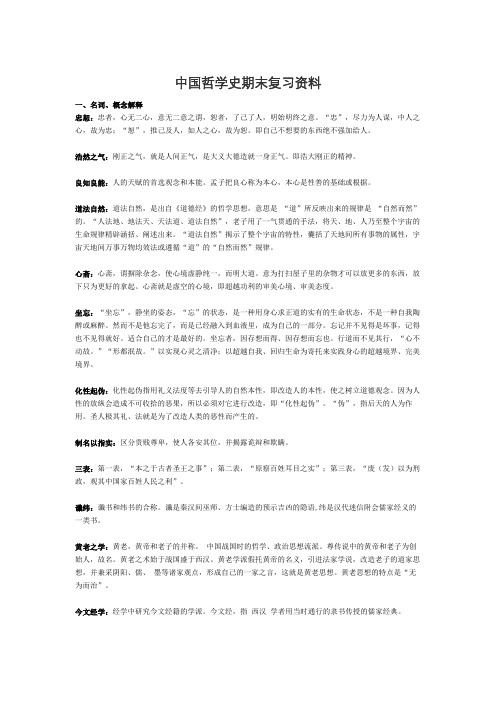
中国哲学史期末复习资料一、名词、概念解释忠恕:忠者,心无二心,意无二意之谓,恕者,了己了人,明始明终之意。
“忠”,尽力为人谋,中人之心,故为忠;“恕”,推己及人,如人之心,故为恕。
即自己不想要的东西绝不强加给人。
浩然之气:刚正之气,就是人间正气,是大义大德造就一身正气。
即浩大刚正的精神。
良知良能:人的天赋的首选观念和本能。
孟子把良心称为本心,本心是性善的基础或根据。
道法自然:道法自然,是出自《道德经》的哲学思想,意思是“道”所反映出来的规律是“自然而然” 的。
“人法地、地法天、天法道、道法自然”,老子用了一气贯通的手法,将天、地、人乃至整个宇宙的生命规律精辟涵括、阐述出来。
“道法自然”揭示了整个宇宙的特性,囊括了天地间所有事物的属性,宇宙天地间万事万物均效法或遵循“道”的“自然而然”规律。
心斋:心斋,谓摒除杂念,使心境虚静纯一,而明大道。
意为打扫屋子里的杂物才可以放更多的东西,放下只为更好的拿起。
心斋就是虚空的心境,即超越功利的审美心境、审美态度。
坐忘:“坐忘”,静坐的姿态,“忘”的状态,是一种用身心求正道的实有的生命状态,不是一种自我陶醉或麻醉。
然而不是他忘完了,而是已经融入到血液里,成为自己的一部分。
忘记并不见得是坏事,记得也不见得就好。
适合自己的才是最好的。
坐忘者,因存想而得、因存想而忘也。
行道而不见其行,“心不动故。
”“形都泯故。
”以实现心灵之清净;以超越自我、回归生命为寄托来实践身心的超越境界、完美境界。
化性起伪:化性起伪指用礼义法度等去引导人的自然本性,即改造人的本性,使之树立道德观念。
因为人性的放纵会造成不可收拾的恶果,所以必须对它进行改造,即“化性起伪”。
“伪”,指后天的人为作用。
圣人极其礼、法就是为了改造人类的恶性而产生的。
制名以指实:区分贵贱尊卑,使人各安其位,并揭露诡辩和欺瞒。
三表:第一表,“本之于古者圣王之事”;第二表,“原察百姓耳目之实”;第三表,“废(发)以为刑政,观其中国家百姓人民之利”。
中国哲学史考试试题
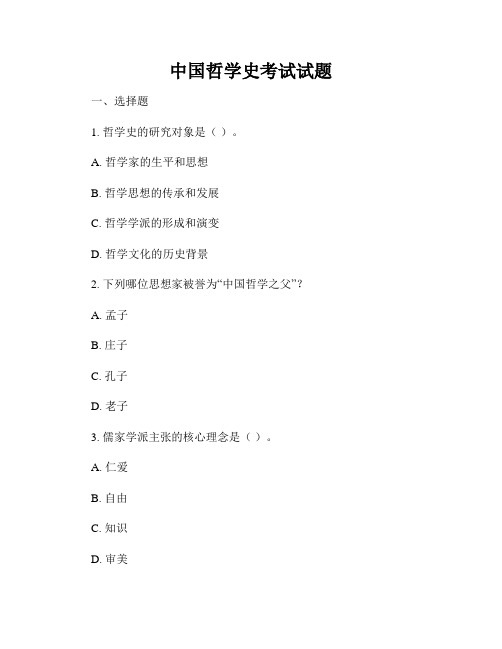
中国哲学史考试试题一、选择题1. 哲学史的研究对象是()。
A. 哲学家的生平和思想B. 哲学思想的传承和发展C. 哲学学派的形成和演变D. 哲学文化的历史背景2. 下列哪位思想家被誉为“中国哲学之父”?A. 孟子B. 庄子C. 孔子D. 老子3. 儒家学派主张的核心理念是()。
A. 仁爱B. 自由C. 知识D. 审美4. 以下哪位古代思想家提出“天人合一”的观点?A. 庄子B. 老子C. 孔子D. 孟子5. 墨家学派注重的是()。
A. 社会公平B. 个人发展C. 祭祀仪式D. 自然和谐二、判断题1. 道家学派强调个体的努力和追求,而儒家学派则注重社会伦理和家庭责任。
()2. 墨家学派主张以爱德来推动社会进步,反对战争和争斗。
()3. 孔子是儒家学派的创始人,也是中国古代最伟大的思想家之一。
()4. 孟子提出了人性本善的观点,认为人天生都有善良和正直的本性。
()5. 佛教的发展和传播对中国哲学史产生了深远的影响,充实了中国哲学的内涵和外延。
()三、简答题1. 简述道家学派的主要思想。
2. 解释儒家学派的核心理念“仁”。
3. 通过对孟子和孔子思想的比较,说明两位学者在儒家学派中的位置和影响。
4. 请列举三位中国古代哲学家的名字,并简要介绍他们的思想。
5. 阐述墨家学派对社会公平的关注和强调。
四、论述题中国古代哲学发展既有不同学派之间的争论,也有学派内部的分歧和演进。
请以儒家和道家为例,对比两个学派的思想特点和影响,以及他们对中国哲学史的重要意义。
注意:以上试题仅为参考,请根据考试具体要求和题目来编写文章。
中国哲学史复习资料重点

中国哲学史一、孔子的正名思想孔子生活的春秋时代,是一个社会极为混乱的时代。
旧的秩序已经被破坏,新的秩序还未建立起来。
孔子一生的志向就是建立一个理想的秩序。
孔子认为造成这种坏风气的原因是名与实不相符,没有一个共同的道德标准。
正名思想:名不正则言不顺,言不顺则事不成,事不成则礼乐不兴,礼乐不兴则刑罚不中,刑罚不中则民无所措手足。
(《子路》)只有正名,才能够挽救秩序的崩溃,促进周礼的复兴;只有周礼才能恰当的运用刑罚,制止邪说暴行的产生和流行。
1、正名的标准是"礼”,即“周礼”;内容即“君君、臣臣、父父、子子。
为君之人必须符合“君”应有之义,为臣之人必须履行“臣名规定的为臣之道,为父、为子之人必须遵守父子”之名规定的伦理规范和道德要求。
所谓“周礼”,就是西周统治者制定的一整套经济、政治制度和道德规范、礼节仪式等。
其中心内容就是以血缘关系为纽带的等级制、分封制和世袭制。
2、孔子对周礼的补充和发展表现在强调道德教化。
3、周礼的世袭宗法等级制度完全是“亲亲”的,孔子主张在维持周礼亲亲的原则下,在一定程度内实行“贤贤”作为补充。
4、孔子为了复兴周礼,对周礼的再一个补充和发展就是提出“仁”" 作为礼的内容。
二、中庸之道1、中庸是一种至高的德行,是小人和君子的区别之一。
2、中庸是处世做事的最佳标准和尺度。
在孔子看来,过和不及都是不好的,人的思想和行为最好的状态是中道。
3、中庸要求遵守一定的标准,但又反对不顾一切地拘守某一固定标准不凭空臆测,不绝对肯定,不固执己见,不自以为是。
4、强调中庸的灵活原则,完全服从于他所要达到的道义原则。
三、"明于天人相分”的自然主义天道观天道观即关于世界本原的根本观点。
荀子是第一个从理论上较为系统地、明确地对天给予自然的解释的思想家。
荀子的自然观与儒家不同,主要是继承了”道法自然”的思想。
他的《天论》是一篇杰出的黄老之学自然哲学著作。
1、天道自然的思想荀子认为,“天”就是客观存在的自然界,把自然界看作是物质的东西,自然界的变化是物质本身固有的规律,没有任何神秘的色彩。
哲学:中国哲学史考试题库四
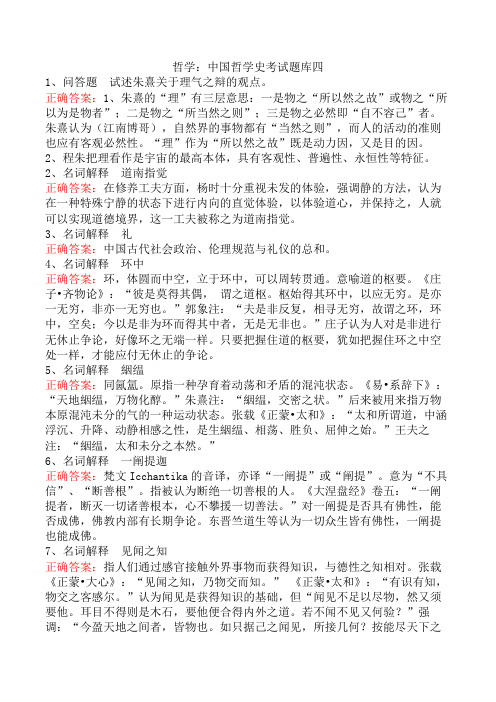
哲学:中国哲学史考试题库四1、问答题试述朱熹关于理气之辩的观点。
正确答案:1、朱熹的“理”有三层意思:一是物之“所以然之故”或物之“所以为是物者”;二是物之“所当然之则”;三是物之必然即“自不容己”者。
朱熹认为(江南博哥),自然界的事物都有“当然之则”,而人的活动的准则也应有客观必然性。
“理”作为“所以然之故”既是动力因,又是目的因。
2、程朱把理看作是宇宙的最高本体,具有客观性、普遍性、永恒性等特征。
2、名词解释道南指觉正确答案:在修养工夫方面,杨时十分重视未发的体验,强调静的方法,认为在一种特殊宁静的状态下进行内向的直觉体验,以体验道心,并保持之,人就可以实现道德境界,这一工夫被称之为道南指觉。
3、名词解释礼正确答案:中国古代社会政治、伦理规范与礼仪的总和。
4、名词解释环中正确答案:环,体圆而中空,立于环中,可以周转贯通。
意喻道的枢要。
《庄子•齐物论》:“彼是莫得其偶,谓之道枢。
枢始得其环中,以应无穷。
是亦一无穷,非亦一无穷也。
”郭象注:“夫是非反复,相寻无穷,故谓之环,环中,空矣;今以是非为环而得其中者,无是无非也。
”庄子认为人对是非进行无休止争论,好像环之无端一样。
只要把握住道的枢要,犹如把握住环之中空处一样,才能应付无休止的争论。
5、名词解释絪缊正确答案:同氤氲。
原指一种孕育着动荡和矛盾的混沌状态。
《易•系辞下》:“天地絪缊,万物化醇。
”朱熹注:“絪缊,交密之状。
”后来被用来指万物本原混沌未分的气的一种运动状态。
张载《正蒙•太和》:“太和所谓道,中涵浮沉、升降、动静相感之性,是生絪缊、相荡、胜负、屈伸之始。
”王夫之注:“絪缊,太和未分之本然。
”6、名词解释一阐提迦正确答案:梵文Icchantika的音译,亦译“一阐提”或“阐提”。
意为“不具信”、“断善根”。
指被认为断绝一切善根的人。
《大涅盘经》卷五:“一阐提者,断灭一切诸善根本,心不攀援一切善法。
”对一阐提是否具有佛性,能否成佛,佛教内部有长期争论。
中国哲学史复习重点

中国哲学史复习重点中国哲学史绪论中国哲学在世界哲学中的地位中国古代哲学的特点一、中国哲学在世界哲学中的地位亚洲经济的腾飞西方科技文明的反思亚洲经济的腾飞①日本,亚洲四小龙经济的腾飞,使管理界进入一个新的阶段,导致企业文化的产生,引起人们对儒家文化关注。
亚洲经济的腾飞1900——1930 泰罗制1930——1960 行为科学(管理心理学)1960——1980 决策理论(三论)1980——企业文化(日本的崛起)涩泽荣一当涩则荣一从政府部门转向经营企业时,认为企业很新颖并且有挑战性,试图引入儒家理论使之驯化。
第二次世界大战后发展起来的大企业,在很大程度上是按他的设想建立的。
涩泽荣一等人提倡“论语加算盘”。
即经济道德合一说。
涩泽荣一开设了《论语》讲习所,本人亲自讲授《论语讲义》,出版的书达千页。
著《论语加算盘》,倡导“论语主义”,“经济道德合一说。
日本现代管理思想家伊藤肇指出:“日本企业家只要稍有水准的,无不熟读《论语》。
孔子的教训给他们的激励,影响至巨。
实例多得不胜枚举。
”②社会原因。
当今世界对中国文化的关注还不仅是由于“四小龙”的经济起飞,还有更深层次的社会原因。
宏观生态环境危机;微观人身心和谐的破坏2011-2-18《参考消息》:“全球资本主义深陷五大危机”(1)人与自然关系严重恶化自然资源(物种、森林、水……)矿物资源生态环境(2)、人身心严重失衡和自然的疏离;和社会的疏离;和上帝的疏离。
二、中国古代哲学特点中国古代哲学包括三个主要部分–自然观,亦称天道观–认识论,亦可称方法论–伦理学,亦可称道德论四个基本特点:1、本体论、认识论与道德论的统一;2、整体与过程的观点3、现实生活与道德理想统一;4、经学与哲学相结合。
1、本体论、认识论与道德论的统一认为宇宙最高本体即是道德的最高原则或基本根源强调求知方法与修养方法的一致(1)宇宙最高本体即是道德的最高原则孔子:——“天”“唯天为大,唯尧则之。
”——《论语·泰伯》老子:——“道”人生理想是“法道”、“从道”。
中国哲学史重点

孔子1 正名思想孔子把春秋时代,看做是礼坏乐崩,臣杀君,子杀父,邪说暴行不断发生的大乱局面。
(1)正名思想的提出要制止上述的“邪说暴行”的流行,就必须恢复周礼的权威,重新肯定宗法等级制度的秩序,而其要害就是要正名。
“名不正则言不顺言不顺则事不成事不成则礼乐不兴礼乐不兴则刑罚不中刑罚不中则民无所措手足。
”《子路》(2)周礼及正名:①所谓周礼,就是西周统治者制定的一整套经济、政治制度和道德规范、礼节仪节等。
其中心内容就是以血缘关系为纽带的等级制、分封制和世袭制。
②正名:具体内容——“君君臣臣父父子子。
”对于君,就应强调君就应该享受的权利,对于臣,就应强调臣应该尽的义务。
孔子就想提出这个理想标准的“名”来纠正那些不符合周礼情况的“实”。
这种用名以正实的观点,就是后来所谓的“名教”。
目的:孔子提出“正名”思想,以求恢复周礼所制订的世袭宗法等级制度。
(3)复兴周礼不完全因袭周礼,完全因袭,已不再能充分地发挥周礼的作用了,所以,他对周礼有一定的补充和发展,即“损益”。
①正名思想使周礼的指导思想更集中、更明确、也更理论化,特别提出要掌握周礼的这种思想实质“礼云礼云玉帛云乎哉?”。
②对周礼的发展的补充和发展表现在强调道德教化。
“上好礼则民易使也”。
③举贤才的思想,周礼的世袭宗法等级制度完全是“亲亲”的,孔子主张在维持的原则下,在一定程度内实行“贤贤”人微言轻补充。
④为了复兴周礼的对其另一个补充和发展是提出仁作为礼的内容。
“人而不仁如礼何”。
仁是所谓德化的具体内容。
孔子关于仁的思想的系统发挥,构成了其思想体系的核心,也是他思想最有特色的地方。
2 仁学思想(1)“克已复礼为仁”“非礼勿视非礼勿听非礼勿言非礼勿动。
”〈颜渊〉。
首先:说明仁的基本性质和内容--约束自己的行为使其符合于礼的规范。
其次:说明仁的一个特点--求仁完全是自觉的,由自己决定。
不依靠他人。
最后:进一步,求仁的具体条目,视听言动。
孔子说仁的性质时,强调了从政治的角度理解仁,即只有恢复礼制,巩固礼所制订的政治秩序的行为才能叫做仁。
哲学:中国哲学史必看考点(最新版)
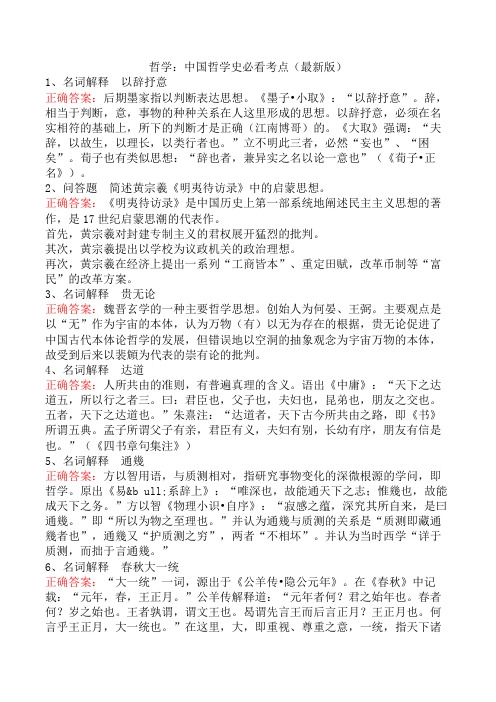
哲学:中国哲学史必看考点(最新版)1、名词解释以辞抒意正确答案:后期墨家指以判断表达思想。
《墨子•小取》:“以辞抒意”。
辞,相当于判断,意,事物的种种关系在人这里形成的思想。
以辞抒意,必须在名实相符的基础上,所下的判断才是正确(江南博哥)的。
《大取》强调:“夫辞,以故生,以理长,以类行者也。
”立不明此三者,必然“妄也”、“困矣”。
荀子也有类似思想:“辞也者,兼异实之名以论一意也”(《荀子•正名》)。
2、问答题简述黄宗羲《明夷待访录》中的启蒙思想。
正确答案:《明夷待访录》是中国历史上第一部系统地阐述民主主义思想的著作,是17世纪启蒙思潮的代表作。
首先,黄宗羲对封建专制主义的君权展开猛烈的批判。
其次,黄宗羲提出以学校为议政机关的政治理想。
再次,黄宗羲在经济上提出一系列“工商皆本”、重定田赋,改革币制等“富民”的改革方案。
3、名词解释贵无论正确答案:魏晋玄学的一种主要哲学思想。
创始人为何晏、王弼。
主要观点是以“无”作为宇宙的本体,认为万物(有)以无为存在的根据,贵无论促进了中国古代本体论哲学的发展,但错误地以空洞的抽象观念为宇宙万物的本体,故受到后来以裴頠为代表的崇有论的批判。
4、名词解释达道正确答案:人所共由的准则,有普遍真理的含义。
语出《中庸》:“天下之达道五,所以行之者三。
曰:君臣也,父子也,夫妇也,昆弟也,朋友之交也。
五者,天下之达道也。
”朱熹注:“达道者,天下古今所共由之路,即《书》所谓五典。
孟子所谓父子有亲,君臣有义,夫妇有别,长幼有序,朋友有信是也。
”(《四书章句集注》)5、名词解释通幾正确答案:方以智用语,与质测相对,指研究事物变化的深微根源的学问,即哲学。
原出《易&b ull;系辞上》:“唯深也,故能通天下之志;惟幾也,故能成天下之务。
”方以智《物理小识•自序》:“寂感之蕴,深究其所自来,是曰通幾。
”即“所以为物之至理也。
”并认为通幾与质测的关系是“质测即藏通幾者也”,通幾又“护质测之穷”,两者“不相坏”。
中国哲学史的考试重点

中国哲学史的考试重点中国哲学史的考试重点以下内容是摘自书中,个人理解或多或少有不足之处敬请原谅。
如有错误请及时提出更改。
一、翻译题(英译汉)共计十题题目组成是关于仁和道的古文,题目为英语,答题用汉语。
五句关于仁,五句关于道。
1.“The child cannot leave the arms of its parents until it is three years old.This is why the three years' mourning is universally observed throughout the world.”答:“子生三年,然后免于父母之怀。
夫三年之丧,天下之通丧也。
”2.“Let the ruler be ruler, the minister minister, the father father, and theson son”.答:“君君,臣臣,父父,子子。
”3.“The superior man comp rehends yi; the small man comprehends li.”答:“君子喻于义,小人喻于利。
”4.“Do not do to others what you do not wish yourself.”答:“己所不欲,勿施于人。
”5.“The man of jen is one who, desiring to sustain himself, sustains others, anddesiring to develop himself, develops others. T o be able from one's own self to draw a parallel for the treatment of others; that may be called the way to practice jen.”答:“夫仁者,己欲立而立人,己欲达而达人。
- 1、下载文档前请自行甄别文档内容的完整性,平台不提供额外的编辑、内容补充、找答案等附加服务。
- 2、"仅部分预览"的文档,不可在线预览部分如存在完整性等问题,可反馈申请退款(可完整预览的文档不适用该条件!)。
- 3、如文档侵犯您的权益,请联系客服反馈,我们会尽快为您处理(人工客服工作时间:9:00-18:30)。
中国哲学史的考试重点以下内容是摘自书中,个人理解或多或少有不足之处敬请原谅。
如有错误请及时提出更改。
一、翻译题(英译汉)共计十题题目组成是关于仁和道的古文,题目为英语,答题用汉语。
五句关于仁,五句关于道。
1.“The child cannot leave the arms of its parents until it is three years old.This is why the three years' mourning is universally observed throughout the world.”答:“子生三年,然后免于父母之怀。
夫三年之丧,天下之通丧也。
”2.“Let the ruler be ruler, the minister minister, the father father, and theson son”.答:“君君,臣臣,父父,子子。
”3.“The superior man comprehends yi; the small man comprehends li.”答:“君子喻于义,小人喻于利。
”4.“Do not do to others what you do not wish yourself.”答:“己所不欲,勿施于人。
”5.“The man of jen is one who, desiring to sustain himself, sustains others, anddesiring to develop himself, develops others. To be able from one's own self to draw a parallel for the treatment of others; that may be called the way to practice jen.”答:“夫仁者,己欲立而立人,己欲达而达人。
能近取譬,可谓仁之方也已。
”6.“Do not use what you dislike in your superiors in the employment of yourinferiors. Do not use what you dislike in your inferiors in the service of your superiors. Do not use what you dislike in those who are be-fore, to precede those who are behind. Do not use what you dislike in those who are behind, to follow those who are before. Do not use what you dislike on the right, to display toward the left. Do not use what you dislike on the left, to display toward the right. This is called the principle of applying a measuring square.”答:“所恶于上毋以使下,所恶于下毋以事上,所恶于前毋以先后,所恶于后毋以从前,所恶于右毋以交壬左,所恶于左毋以交于右,此之谓絮矩之道。
”7.“Chung and shu are not far from the Way. What you do not like done to yourself,do not do to others. ...Serve your father as you would require your son to serve you. ...Serve your ruler as you would require your subordinate to serve you....Serve your elder brother as you would require your younger brother to serve you. ...Set the example in behaving to your friends as you would require them t o behave to you...”答:“忠恕违道不远,,施诸己而不愿,亦勿施于人。
……所求乎子,以事父……所求乎臣,以事君……所求乎弟,以事兄……所求乎朋友,先施之……”8.“Our master's teaching consists of the principle of chung and shu, and thatis all.”答:“夫子之道,忠恕而已矣。
”9.“The reason why the superior man tries to go into politics, is because he holdsthis to be right, even though he is well aware that his principle cannot prevail.”答:“君子之仕也,行其义也。
道之不行,已知之矣。
”10.“Is jen indeed far off? I crave for jen,and lo! jen is at hand.”答:“仁远乎哉?我欲仁,斯仁至矣。
”11.“The wise are free from doubts; the virtuous from anxiety; the brave fromfear.”答:“知者不惑,仁者不忧,勇者不惧。
”12.“The superior man is a lways happy; the small man sad.”答:“君子坦荡荡,小人长戚戚。
”13.“The Tao that can be comprised in words is not the eternal Tao; the name thatcan be named is not the abiding name. The Unnamable is the beginning of Heaven and Earth; the namab le is the mother of all things.”答:“道可道,非常道;名可名,非常名。
无名,天地之始;有名,万物之母。
”14.“The Tao is eternal, nameless, the Uncarved Block...Once the block is carved,there are names.”答:“道常无名,朴。
虽小,天下莫能臣。
……始制有名。
”15.“T he Tao, lying hid, is nameless.”答:“道隐无名。
”16.“The Unnamable is the beginning of Heaven and Earth; the namable is the motherof all things.”答:“无名,天地之始;有名,万物之母。
”17.“From the past to the present,,its [Tao's] name has not ceased to be, andhas seen the beginning [of all things].”答:“自古及今,其名不去,以阅众甫。
”18.“All things in the world come into being from Being (Yu); and Being comes i ntobeing from Non-being (VVu).”答:“天下万物生于有,有生于无。
”19.“From Tao there comes one. From one there comes two. From two there comes three.Fro m three there comes all things.”答:“道生一,一生二,二生三,三生万物。
”20.“The way of Heaven has no favorites, it is invariab ly on the side of the goodman.”答:“天道无亲,常与善人。
”21.“Reversing is the movement of the Tao.”答:“反者道之动。
”22.“It is upon calamity that blessing leans, upo n blessing that calamity rests.”答:“祸兮,福之所倚;福兮,祸之所伏。
”23.“The most yielding things in the world master the most unyielding.”答:“天下之至柔,驰骋天下之至坚。
”24.“All t hings respect Tao and value Te.”答:“万物莫不尊道而贵德”25.“When the Tao is lost, there is the Te. When the Te is lost, there is [thevirtue of] human-heartedness. When human-heartedness is lost, there is [the virtue of] righteousness. When righteousness is lost, there are the ceremonials.Ceremonials are the degeneration of loyalty and good faith, and are the begi nning of disorder in the world.”答:“失道而后德,失德而后仁,失仁而后义,失义而后礼。
夫礼者,忠信之薄而乱之首。
”26.“Tao invariably does nothing and yet the re is nothing that is not done.”答:“道常无为,而无不为。
”27.“Does not make them enlightened, but keeps them ignorant.”答:“古之善为道者,非以明民,将以愚之。
”二、名词解释题目为中文,答案为英文。
一共四个词,两套卷共八个。
